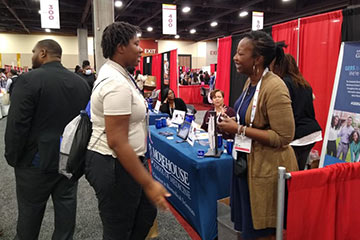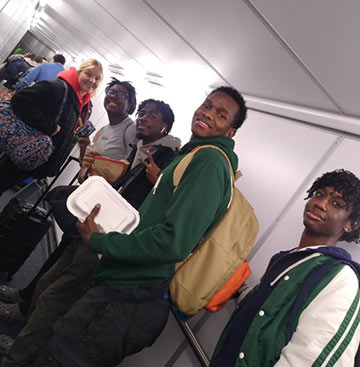
12/05/2023
Five SUNY Cortland students had a chance to strengthen their future career goals through a trip to the Annual Biomedical Research Conference for Minoritized Scientists (ABRCMS) from Nov. 15 to 18 in Phoenix, Arizona.
The visit to the conference, which supports historically excluded students in STEM (science, technology, engineering and mathematics) fields, was organized by the Cortland chapter of the Louis Stokes Alliances for Minority Participation (LSAMP) program with help from the Cortland College Foundation, and was funded through a grant from The John Ben Snow Foundation.
This was the first time the university attended the conference.
“We were there for four days, and the conference is a mixture of professional development and scientific presentations.,” said Christa Chatfield, professor of biological sciences and co-director of Cortland LSAMP with Professor Tricia Conklin, chair of the university’s Biological Sciences Department. “There was a program about gap years, there was one about time management — so ranging from all different kinds of professional skills.”
Cortland has been a part of LSAMP, which has a stated goal to “assist universities and colleges in diversifying the nation’s science, technology, engineering and mathematics workforce,” for three years.

The students from Cortland selected for the trip and their majors were: Bradley Blake of Poughkeepsie, N.Y., biochemistry; Mamadou Diallo of Brooklyn, N.Y., biomedical sciences; Abby Heneghan of Manorville, N.Y., biology; Dwayne Jones of Brooklyn, N.Y., biology; and Kyla Young of Brooklyn, N.Y., biomedical sciences.
Heneghan, who wants to become a physician assistant, expects to take a gap year after graduation, using the time to work while studying for the Physician Assistant College Admission Test.
“I was able to gain so much knowledge, networking and communication skills,” she said. “This experience was truthfully so impactful on my career. I hope to keep attending the ABRCMS conference in the upcoming years.”
Chatfield said that even though the students’ research wasn’t far along enough for them to present, the experience they gained as students was invaluable to their future plans, and that they may be able to discuss their findings at next year’s conference in Pittsburgh.
“They had a chance to interact with a lot of students who are in graduate or medical programs who are from underrepresented groups,” Chatfield said. “So, I think having a conversation with the student at a program that you want to join about what it’s really like is an invaluable connection to really know if it’s the right place for you.”
The students’ growth from the start to the end of the conference was tangible, she noted.
“They all really felt empowered and enthusiastic about their careers and what might be possible after meeting all of these people who were ahead of them in the process.”
Young said what she’s learned through LSAMP so far has helped her to pursue a job in emergency medicine.

“I was interested in going to ABRCMS because I plan on submitting presentations for national conferences, so I thought I could get a look into what it looks like firsthand,” she said. “This was my first big conference ... so it was pretty exciting. We attended different scientific talks, professional development workshops, networked with people from across the country and talked to representatives from different colleges, universities and post-bachelor programs.”
The students were able to connect with recruiters for those programs and have fees waived for whichever programs they chose to apply for. An exhibition space gave participants a chance to talk to close to 500 exhibitors who were recruiting for their schools.
“They all gain the skills of self-promotion and communication,” Chatfield said. “The first day ... they were all really nervous to converse with these individuals, but by the last day of the exhibition they were walking right up and introducing themselves and saying what they’re interested in and where they were going to school.”
Cortland LSAMP also directs the Summer Bridge program, which lets first-year and transfer students get summer experience ahead of their first semester with a visit to the William H. Parks Family Center for Environmental and Outdoor Education at Raquette Lake in the Adirondacks. They work with faculty to collect scientific data about the geology, biology and chemistry of the lake.
Participants in LSAMP get to attend two seminars featuring visiting scholars from underrepresented backgrounds and go to a regional symposium of LSAMP-involved schools — an alliance called the CNYLA — where students come together near the end of the summer to present their research.
Jones, who plans to attend medical school on his way to becoming a physician, said he’s found LSAMP to be a help to him from the start.
“I was able to meet fellow Cortland LSAMP students during our trip to Raquette Lake trip as well as a few professors in a relaxed and casual setting. Also, being able to do research is a great experience for students, however it may seem intimidating to get into. I’m glad this program gave me a way to become involved in research during my first year at Cortland.”